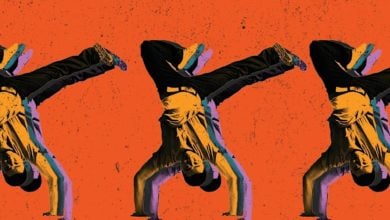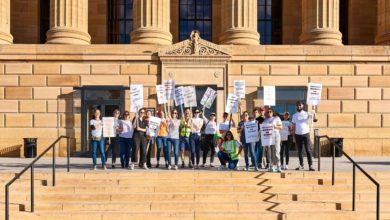
The popularity of Michael Moore’s documentary “Fahrenheit 9/11” speaks to an evolving political consciousness in the United States. The movie should be viewed from two different but equally important vantage points: the significance of the movie’s popularity and its inadequacy in providing accurate analysis or real political solutions to the problems it addresses.
Michael Moore has directed documentaries dealing with social issues like corporate greed (“Roger and Me”) and gun control (“Bowling for Columbine”). “Fahrenheit 9/11” presents an account of the Bush administration’s handling of the September 11, 2001, attacks on the World Trade Center and the Pentagon. It gives a critical view of the U.S. war on Iraq.
The movie has been wildly popular. It was the top grossing movie in the United States during its first week of distribution, and it became the largest grossing documentary of all time.
Beyond ticket sales, “Fahrenheit 9/11” has become a topic of conversation both in political circles and in popular culture. White House Communications Director Dan Bartlett, the Congressional Black Caucus, military families and David Letterman have all responded publicly to the movie.
Websites for car racing fans now contain a description of Fox Sports announcer Chris Myers reporting during a live broadcast of a NASCAR race that Dale Earnhardt Jr. took his crew to see “Fahrenheit 9/11.” Some of these normally apolitical websites go on to praise the movie, others to attack it.
Moore describes the movie’s reaction on his website. “One theatre manager after another phoned in to say that the movie was getting standing ovations as the credits rolled—in places like Greensboro, NC and Oklahoma City. … Theaters in the Deep South and the Midwest set house records for any film they’d ever shown. Yes, it even sold out in Peoria. And Lubbock, Texas. And Anchorage, Alaska!”
Conservative sectors have attacked the film, even trying to intervene and stop its release. Disney originally financed it, and then refused to release it through Disney or through its Miramax division, delaying the movie’s release. Some theater chains, like GKC Theaters in Illinois, have refused to screen it.
Exposing little-reported truths
Many truths about politics in the United States, capitalism and the horrors of war are given excellent treatment. Many people will be exposed to these truths for the first time. They are certainly not the subject of daily news reports.

Moore accurately reminds people of Bush’s pre-September 11 unpopularity. He describes the big business media’s role in creating a culture of fear after September 11, designed to manipulate U.S. public opinion. The movie illustrates the scripted and orchestrated message of the bourgeois media, and demonstrates clearly its function as an arm of the ruling establishment.
Treating the U.S. war against Iraq, he shows the horrors of war for the Iraqi people: homes bombed and raided, civilians maimed and killed.
Moore shows military recruiters targeting working class communities, and particularly communities of color. He describes the reality of poverty, unemployment and lack of opportunities throughout U.S. cities that creates an “economic draft.” He elicits sympathy for the soldiers, showing their fear and unhappiness, while at the same time showing the reality of the culture of racism and brute force that exists among the troops.
The soldiers in Iraq speak to the camera with great frankness, criticizing Bush and Defense Secretary Donald Rumsfeld. Pressure from the Pentagon silences many soldiers, but discontent is clearly growing and, as it does, soldiers are increasingly willing to speak out.
In a powerful opening sequence, Moore highlights the racist disenfranchisement of Black voters in Florida and elsewhere that became a central feature of the 2000 elections. Footage of a joint session of Congress shows many Congressional delegates—all African American and one Asian woman—challenging Bush’s right to assume the presidency. All were denied the right to speak because not one Senator had signed their letter to open a floor debate on the issue. Ironically, Gore—as the vice-president and therefore President of the Senate—is presiding over this session and ruling them all out of order.
The tail wagging the dog
One of the movie’s main faults is its failed attempt to explain the Bush administration’s policies after September 11. While the movie does expose the role of big business in U.S. politics, the first half contains a completely false portrayal of the U.S. relationship to Saudi Arabia.
Moore paints a picture of Saudi Arabian “ownership” of the U.S., saying they “own” 7 percent of the U.S. economy. He makes much of the $1.4 billion that Saudis have invested in the Bush family’s and associates’ businesses over the past 30 years. He concludes that when Bush wakes up in the morning, he thinks about what’s best for the Saudis, not for U.S. taxpayers. Moore promotes a popular misconception that the Saudis could cause an economic collapse in the U.S. if they withdrew their money.
The reality is that all of the money the Saudi Arabian bourgeoisie makes goes into U.S. and other Western banks. Those banks control that money. The movie presents a “tail wagging the dog type scenario,” flipping the U.S.-Saudi relationship upside down and implying that Saudi Arabia controls U.S. policy. The truth is, when Bush gets up in the morning, he thinks about what’s best for U.S. capitalists and how they can use Saudi Arabia to secure domination over the oil-rich Middle East.
Saudi Arabia has played a key role for U.S. imperialism in the Middle East, both because of its vast size (the largest land mass in the Middle East) and oil reserves (the largest in the world), and because of its position as a puppet regime and a brake on the Arab revolution.
Moore manages to spend the entire first half of his movie talking about Saudi Arabia while never once mentioning that the land of Mecca and Medina, the holiest sites Islam, has been occupied by U.S. troops since the 1990 build-up for the Gulf War. This fact is a great source of anger and rage throughout the Arab and Muslim world.
Implicit racism
This entire first section of the film dealing with Saudi Arabia is filled with anti-Arab racism and demonization. Moore’s sequence on Bush’s “coalition of the willing” uses racist images and a chauvinist tone to depict the participation of Palau, Costa Rica and Morocco.
Moore’s segment criticizing the Patriot Act does not even mention the thousands of Arab, Asian and Muslim people who have been detained, harassed, arrested, interrogated and/or deported since September 11. Instead, Moore focuses on Patriot Act targets that he implicitly assumes will be less threatening to a mainstream white audience—an almost entirely white peace group and a white gym-goer. This omission relies on a racist stereotype that Arab and Muslim people who have been targeted by the government are somehow inherently less innocent and non-threatening.
Where was the anti-war movement?
The other major omission in Fahrenheit 9/11 is that Moore manages to spend the entire second half of his movie talking about the war in and occupation of Iraq while never dealing with the anti-war movement that developed in response (outside of some brief references).
In 2002 and 2003, the anti-war movement became so massive, involving so many tens of millions of people in the U.S. and around the world actively taking to the streets, that on Feb.17, 2003, the New York Times called it the “the world’s other superpower.” Yet the many participants in these demonstrations won’t find a single mention or any footage of this movement.
The Kerry trap
This glaring omission is related to the most serious shortfall of the movie: Moore does not offer any direct solutions to the problems of war or corporate control of U.S. politics. Coming in an election year, however, and with no message to the contrary, this leaves viewers within the Bush-Kerry trap.
Indeed, many Kerry and Democratic Party supporters are trying to turn film audiences into Kerry supporters. The group MoveOn.org has been using the movie to hold house parties and conference calls with Moore. Their purpose: to recruit tens of thousands of people to become active volunteers for Kerry’s campaign.
While the movie is not specific in its solution, Moore’s website is. It features a section called “Okay, I’ve seen the movie. What do I do now?” This section asks visitors to take “Mike’s Pledge” which has four points: “1) I Will Register 10 People to Vote This Summer, 2) I Will Spend One Weekend In October In a Swing State, 3) I Will Adopt 5 Non-Voters I Know and Take Them to the Polls, and 4) I Will Take-Off Work or School on Election Day and Volunteer to Get Out the Vote.”
Kerry voted for the war in Iraq, and promises to send even more troops into war if he is elected.
There are a host of other problems. The true roots of the September 11 attacks—the great anger in the Arab world against the U.S. government’s drive for neo-colonial domination, its occupation of Saudi Arabia and other countries, its support for the Israeli occupation of Palestine, and the 1990 – 2003 U.S.-led UN sanctions on Iraq—are not discussed at all.
Moore’s implication that Bush could have prevented the September 11 attacks if he had strengthened security measures earlier accepts the premise that the state apparatus—including the border police, FBI, CIA and other “homeland security” agencies—are really structured to protect working people as opposed to increasing repression.
For those seeking to raise class consciousness of people in the United States, who truly want to build a new mass, independent movement that can become a potent and effective force, the movie falls far short of providing answers to why the war started and how to end it. On some issues it does the opposite, fostering confusion and misunderstanding.
But for many, “Fahrenheit 9/11” will be an eye-opening view on the U.S. government and its war on Iraq that Democratic and Republican politicians, along with the big business media, have tried hard to conceal. The film’s section on Iraq offers a tremendous amount of images that those outside the anti-war movement have never seen or had access to.
While Moore and many of his supporters are hoping that the information contained in the movie pushes people into the electoral arena, the movie actually contains the basis for people to go far beyond this understanding. Moore’s treatment of the struggles of working class people in the U.S. and the increasing opposition on the part of the soldiers to the occupation—the Achilles heel of the “war on terrorism”—are actually the basis for a far more radical analysis of capitalism and imperialism.
What if the thousands of troops who will see Moore’s film decided that they would no longer fight for the sake of Bush, Kerry, Halliburton and the rich?
Iraqi prisoner at Abu Ghraib prison.





